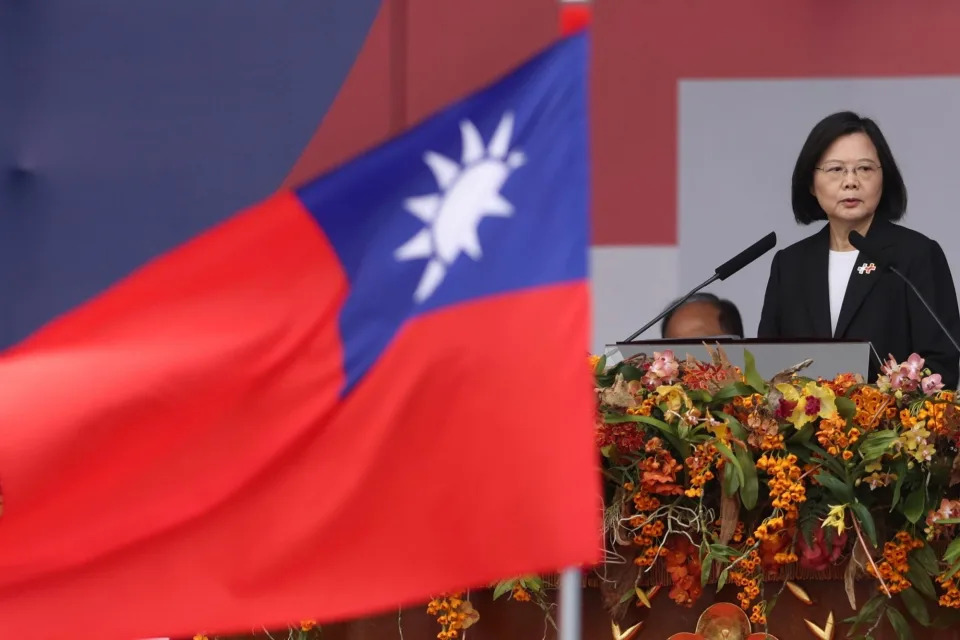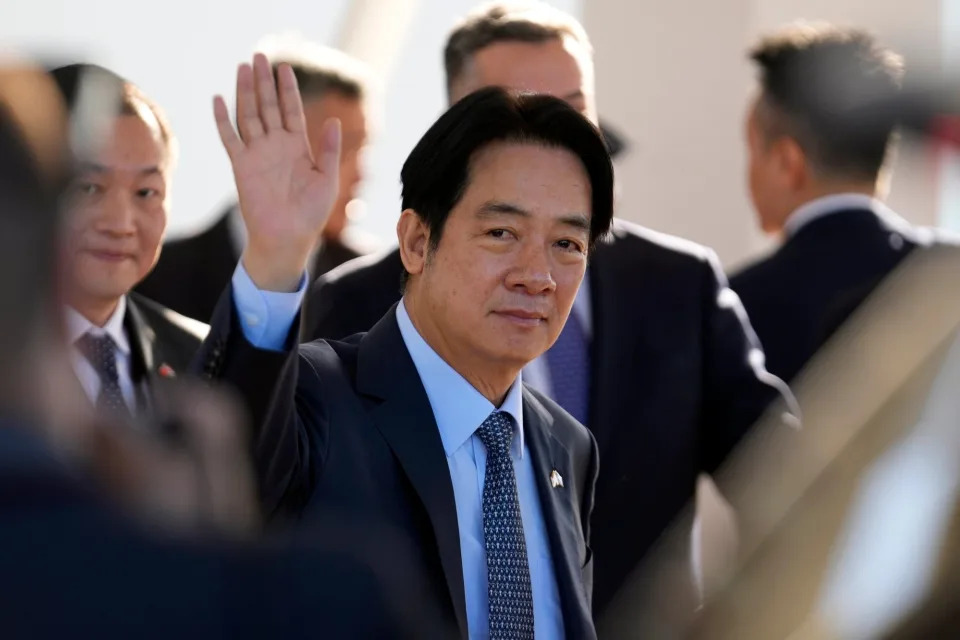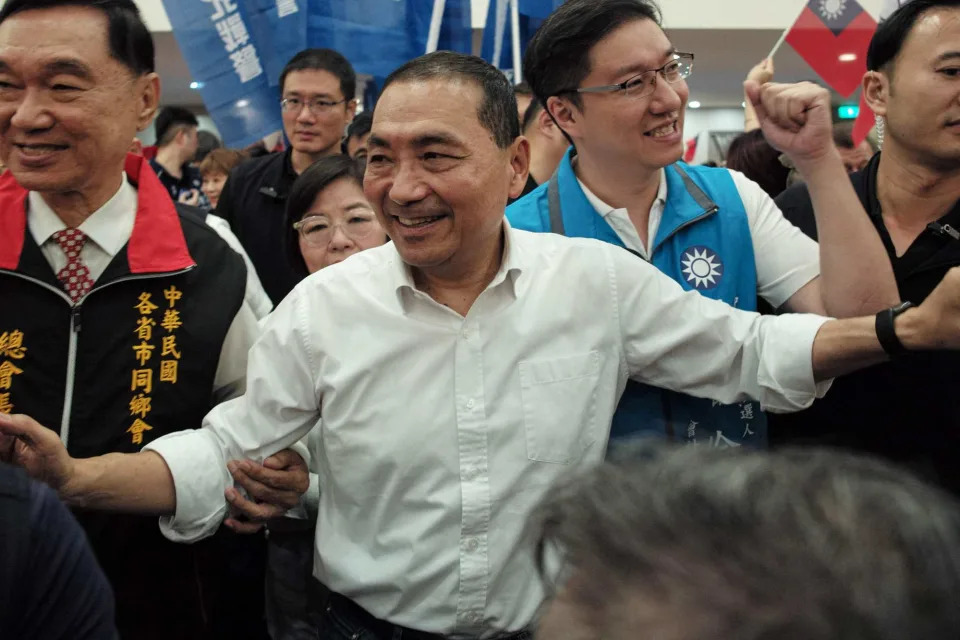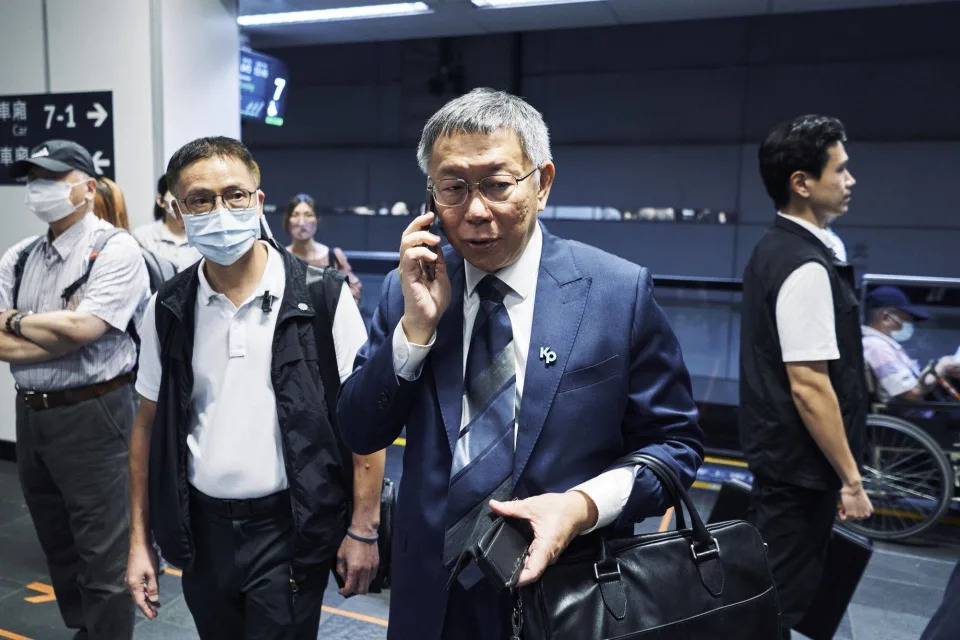Three months before Taiwan's presidential election, the main contenders have mostly wrapped up efforts to garner support in Washington, and, analysts say, managed to convince policymakers that they do not seek to cross any red lines set by the US or Chinese governments.
With military tensions in the Taiwan Strait and around the island reaching unprecedented levels, their audiences were mostly looking for assurances from the Democratic Progressive Party (DPP) candidate that he would not declare independence; from the opposition Kuomintang (KMT) candidate, they wanted to know that he would not work to appease Beijing.
The election to succeed President Tsai Ing-wen on January 13 looms as the frequency and scope of military operations in the area have grown, with the People's Liberation Army assuming a "worrisome" posture towards Taiwan, noted Danny Russel, vice-president for international security and diplomacy at the Asia Society Policy Institute.
"Beijing's rhetoric about Taiwan and unification is vastly more assertive and worrisome," Russel said. "The PLA's behaviour is breaking norms and magnifying risk to a degree that we haven't seen before".

Taiwanese President Tsai Ing-wen's second and final term ends next year. Photo: EPA-EFE alt=Taiwanese President Tsai Ing-wen's second and final term ends next year. Photo: EPA-EFE>
Russel, the top US diplomat for Asia during the Barack Obama administration, said he did not believe that the messages that reached the ears of relevant people in the administration were alarming. "I think that they were well designed to be reassuring."
Beijing considers Taiwan a rogue province, to be eventually united with the mainland, by force if necessary. The United States switched diplomatic recognition from Taipei to Beijing in 1979, and ever since, like most other countries, does not consider the self-governing island an independent state.
But US maintains unofficial ties and supplies the island with a range of weapons to defend itself against any potential attack.
In recent weeks, each of Taiwan's three leading presidential candidates - Taiwanese Vice-President William Lai Ching-te, the ruling DPP's candidate; the KMT's Hou Yu-ih, the mayor of New Taipei; and Ko Wen-je, the Taiwan People's Party chairman - have visited the United States.
The trips let US officials familiarise themselves with the contenders and their policies while burnishing the candidates' overseas credentials with voters back home.
Foxconn founder Terry Gou, who is running as an independent candidate, also visited the US in July, before he announced his bid.
The DPP's Lai stopped in the US to and from Paraguay in August. As a current representative of Taiwan's government, his movements in the US were more restricted than those of the other contenders.
His passage was part of transit arrangements customarily used by top Taiwanese officials to engage with US representatives on American soil on their way to or from other countries. Beijing opposes the practice, and showed its displeasure most recently in April, when Tsai met then-House speaker Kevin McCarthy during a transit stop in California.
McCarthy, who met Tsai at the Ronald Reagan Presidential Library in Simi Valley, was joined by a bipartisan group of 17 other lawmakers including Pete Aguilar of California, the third-ranking House leader in the Democratic Party, as well as 10 members from the House Select Committee on the Chinese Communist Party.

Taiwanese Vice-President William Lai Ching-te, the Democratic Progressive Party (DPP) presidential candidate, arriving in Luque, Paraguay, on August 14. Photo: AP alt=Taiwanese Vice-President William Lai Ching-te, the Democratic Progressive Party (DPP) presidential candidate, arriving in Luque, Paraguay, on August 14. Photo: AP>
Lai's itineraries in New York and San Francisco avoided the same kind of high-profile engagement. He had talks with Laura Rosenberger, head of the American Institute in Taiwan (AIT), the de facto US embassy in Taiwan, but no public meetings with other US government officials or lawmakers. His public appearances mainly involved events with overseas Taiwanese.
In an interview published by Bloomberg during his trip, Lai said that "it is not necessary to declare independence" as "Taiwan is already a sovereign, independent country"- a stance that is notably less controversial than what he used to call himself: "a pragmatic worker for Taiwan independence".
During his trip, Beijing slammed Lai as a separatist "troublemaker" and launched a round of military exercises around the island roughly a day after he returned to Taiwan.
In September, Hou made an eight-day trip to the US. He met 16 US lawmakers, several former US government officials, and policy researchers in Washington and other cities.
He also visited the AIT offices in Virginia. Rosenberger said on X, the platform formerly known as Twitter, that she "enjoyed a productive and thoughtful discussion" with Hou.

Hou Yu-Ih, presidential candidate from the opposition Kuomintang (KMT), at a campaign event in Taipei on September 27. Photo: AFP alt=Hou Yu-Ih, presidential candidate from the opposition Kuomintang (KMT), at a campaign event in Taipei on September 27. Photo: AFP>
In an article for Foreign Affairs magazine, Hou pledged to strengthen Taiwan's defence capabilities and deter the use of force by the mainland by enhancing cooperation with partners and allies, in particular with the US.
Ko, chairman of TPP - the third-largest party in terms of representation in Taiwan's legislature - took a four-day "technology-oriented" trip this month to Silicon Valley and Stanford University in California. In a post on X, Ko said he had "experienced the transformative power of AI innovation, which is set to revolutionise all professions and jobs in the future" during his stay in the US.
For all the territory that Lai, Hou and Ko covered while visiting the US, their activity was largely under the radar.
None of the three raised any obvious concerns among analysts or policymakers in Washington, according to Michael Cunningham, a senior research fellow at the Heritage Foundation's Asian Studies Centre.

Ko Wen-je, the Taiwan People's Party (TPP) presidential candidate, campaigns in Taipei. Photo: Bloomberg alt=Ko Wen-je, the Taiwan People's Party (TPP) presidential candidate, campaigns in Taipei. Photo: Bloomberg>
Cunningham said that Lai's independence-seeker reputation was overstated even before he arrived in the US.
"When it comes to reports that a lot of people in Washington are worried about [Lai's independence advocacy], I don't really know who they're referring to because most of Washington seems to - despite not having an official position - be more green than they are blue," he said, referring, respectively, to the colours associated with the DPP and the KMT.
That preference "is probably partly a reflection of the fact that the DPP has had such great outreach to America", Cunningham added.
During Hou's appearance at Heritage - a conservative think tank that has always pushed for a strong defence of Taiwan - Cunningham said that the candidate gave the impression the KMT had moved on from prioritising engagement with Beijing.
Insisting that deterrence and defence capabilities were as important as cross-strait dialogue, Hou told the Heritage audience that his party was "past the Ma Ying-jeou era", referring to Taiwan's last KMT president, who served from 2008 to 2016.
"There were a lot of misperceptions about where the KMT stands on a lot of issues, and [Hou] helped to clear a lot of that up," Cunningham said. "In my conversations with other people who met with him, it seems he came across as being strong on defence, strong on preserving Taiwan sovereignty."
The KMT has made an issue of Lai's past pro-independence comments, and despite Hou's assurances that he aims to take a pragmatic path between defence against and engagement with Beijing, US policymakers do not expect a KMT victory to end cross-strait tension.
"There are few, if any, who believe that the honeymoon of a KMT administration would endure very long," said Russel. "After all, even former president of Taiwan Ma Jing-jeou, in his second term, came to a standstill in improving cross-strait relations."
Washington repeatedly says it will not take sides to avoid interfering in the island's election, as it has done since Taiwanese began electing their presidents directly in 1996. That stance also avoids giving Beijing ammunition in its long stand-off with Washington over Taiwan's status.
Questions about the candidates from the South China Morning Post to more than a dozen US lawmakers with strong foreign policy roles went unanswered. These included queries to Senators Dan Sullivan of Alaska, a Republican, and Jeff Merkley of Oregon, a Democrat - who posed together for a photo with Hou last month.
It was great introducing Mayor @houyuih to @SenDanSullivan while we were in #DC! I specifically brought 96 #Taiwan Strait Crisis morale patches to give to the Senator; we were both serving in the Strait during the crisis. That experience taught us both the importance of peace! pic.twitter.com/eNafPiTACz
- 江啟臣|JOHNNY CHIANG (@JohnnyChiang12) September 21, 2023
With few in Washington willing to offer assessments, the Taiwanese must draw their own conclusions, which could become a significant factor in the outcome.
Candidates perceived to have greater US support tend to attract greater attention from Taiwanese voters, said Huang Huei-hua, a senior researcher at the Taiwan International Strategic Study Society, a Taipei think tank.
"Most Taiwanese people are keen to have more solid and deeper relations with the United States, hoping such ties can become formalised to the state of high-level official contacts," she said. "Voters here would tend to give their ballots to the candidates whom they believe would have the US endorsement most."
She added: "William Lai appears to have a bigger chance to become the US preferred candidate, given that his democratic-versus-authoritarianism political stand is in line with Joe Biden's."
Lai has also vowed that, if elected, he would adhere to President Tsai's policies, in particular her reluctance to formally declare independence.
Li Da-jung, a professor of international relations and strategic studies at Tamkang University in New Taipei City, said these assurances from Lai were needed because some in the US were "still concerned about his political stand [calling for independence], as he might be pushed by fellow hardliners to achieve the goal".
On the other hand, Li added, Hou impressed the US think tanks and political circles with policies he would adopt if elected, including cross-strait, defence and US relations.
"Hou is a predictable type of person who is firm and stable, and in many ways matches the US interests," Li said, adding that Hou's presentations of his policies and his well-prepared responses had surprised many in the US.
Huang said that neither Ko nor Gou got much traction. Both, she said, were "unable to get to the core policymaking group in the US as reflected by the lack of enthusiastic responses from Washington's political and think tank circles during their US visits".
Recent polls show Lai from DPP is taking the lead in the race, while Hou of KMT and the TPP's Ko were competing for second place.
The latest survey result released by online media my-formosa.com on October 14 showed that Lai received 36 per cent of voter support, far ahead of Hou's 19.8 per cent and Ko's 17.2 per cent. The one released by Sanlih Television on October 5 found Lai at 32.2 per cent followed by Ko's 26.8 per cent and Hou's 20 per cent.
Whoever emerges strongest going into the election, few expect pledges to create stability across the Taiwan Strait - however sincere - to reverse the trend of more military operations that have turned the area into one of the world's leading strategic flashpoints.
"It may be that [the candidates] want to bring peace. It may be that they want to achieve absolute deterrence and asymmetric defence virtually overnight. It may be that they want to cure cancer," Russel said. "But that doesn't mean they'll be able to deliver."


